
The politics of Trinidad and Tobago function within the framework of a unitary state regulated by a parliamentary democracy modelled on that of the United Kingdom of Great Britain and Northern Ireland, from which the country gained its independence in 1962. Under the 1976 republican Constitution, the monarch was replaced as head of state by a President chosen by an electoral college composed of the members of the bicameral Parliament, consisting of the Senate and the House of Representatives.
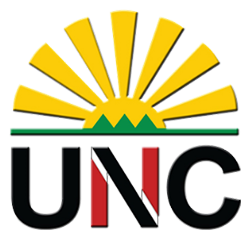
The United National Congress is one of two major political parties in Trinidad and Tobago and the current parliamentary opposition. The UNC is a centre-left party. It was founded in 1989 by Basdeo Panday, a Trinidadian lawyer, economist, trade unionist, and actor after a split in the ruling National Alliance for Reconstruction (NAR). After spending six years in opposition, the UNC won control of the government in 1995, initially in coalition with the NAR and later on its own. In the 2000 general election, the UNC won an absolute majority in the Parliament. In 2001, a split in the party caused the UNC to lose its parliamentary majority and control of the government. From 2001 to 2010, the UNC was once again Parliamentary Opposition party. In May 2010, the UNC returned to government as the majority party in the People's Partnership. The UNC's Political Leader, Kamla Persad-Bissessar, was sworn in as the first female Prime Minister of Trinidad and Tobago. Kamla Persad-Bissessar was Prime Minister from 2010 until 2015.

The People's National Movement (PNM) is the longest-serving and oldest active political party in Trinidad and Tobago. The party has dominated national and local politics for much of Trinidad and Tobago's history, contesting all elections since 1956 serving as the nation's governing party or on four occasions, the main opposition. It is one out of the country's two main political parties. There have been four PNM Prime Ministers and multiple ministries. The party espouses the principles of liberalism and generally sits at the centre to centre-left of the political spectrum.

The Tobago House of Assembly (THA) is a unicameral devolved legislative body responsible for the island of Tobago within the unitary state of Trinidad and Tobago. The THA was re-established in 1980 to rectify some of the disparities in the relationship between the two islands; a prior body of the same name existed from 1768 to 1874. In addition to the normal local government functions, the THA handles many of the responsibilities of the central government, but has limited ability to collect taxes and to impose local law or zoning regulations. At the helm of the Assembly Legislature is the Presiding Officer with the fifteen elected assemblymen, and four appointed councillors. Three of the councillors are appointed on the advice on the Chief Secretary and one on the advice of the Minority Leader. The Chief Secretary is the leader of the majority party in the assembly and is at the helm of the Executive arm of the THA.
Ralph Maraj is a Trinidad and Tobago politician, actor, playwright, and teacher. He served as Minister of Foreign Affairs under a People's National Movement (PNM) administration, Minister of Communication and Information Technology under a United National Congress (UNC) administration, and was a founding member of National Team Unity before returning to the PNM to work as a speech writer for Prime Minister Patrick Manning. Prior to entering politics in 1991, Maraj worked as a teacher at Naparima College in San Fernando. He also attended that school. He wrote several plays, the most successful being Cynthia Sweetness. Maraj also starred in the movies The Right and The Wrong (1969) and Bim (1974), described by Bruce Paddington as "one of the most important films to be produced in Trinidad and Tobago".

The Congress of the People (COP) is a political party in Trinidad and Tobago. Its current political leader is Kirt Sinnette. Its symbol is the "Circle of Circles".
General elections were held in Trinidad and Tobago on 5 November 2007. Nomination day was 15 October. Five parties contested the elections; the ruling People's National Movement, the official opposition United National Congress–Alliance, the Congress of the People, the Tobago United Front–Democratic Action Congress and the Democratic National Assembly. Five independent candidates also ran.

Early general elections were held in Trinidad and Tobago on 7 October 2002, after People's National Movement leader Patrick Manning had failed to secure a majority in the hung parliament produced by the 2001 elections. This time the PNM was able to secure a majority, winning 20 of the 36 seats. Voter turnout was 69.6%.

General elections were held in Trinidad and Tobago on 24 May 2010. The date of the general elections was announced by Prime Minister Patrick Manning on April 16, 2010, via a press release. The election was called over two years earlier than required by law. Polls showing that the UNC-led opposition coalition was likely to win the election were confirmed by the subsequent results.

The People's Partnership (PP) was a political coalition in Trinidad and Tobago among five political parties: the United National Congress (UNC), the Congress of the People (COP), the Tobago Organization of the People (TOP), Movement for Social Justice (MSJ) and National Joint Action Committee (NJAC). The political leader was Kamla Persad-Bissessar. The coalition was formed in advance of the 2010 general election attempting to form a multi-ethnic opposition bloc against the People's National Movement (PNM) government led by Patrick Manning. The coalition won the 2010 General Elections defeating the People's National Movement on May 24, 2010. On September 7, 2015, the coalition was defeated in the 2015 General Elections to the People's National Movement led by Keith Rowley. The coalition saw the departure of the Movement for Social Justice in 2012 and eventually disbanded on December 8, 2015.

The Independent Liberal Party was a political party of Trinidad and Tobago. It was formed in July 2013, after Jack Warner was not reselected as the candidate for the Chaguanas West by-election for the United National Congress (UNC) party. It was launched at a political rally, in Jubilee Grounds, Pierre Road, Chaguanas.
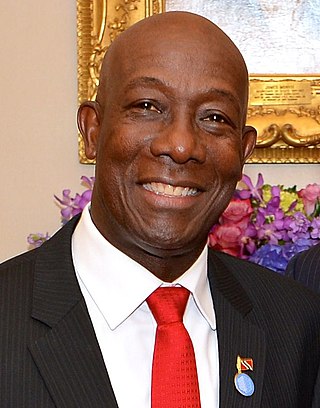
General elections were held in Trinidad and Tobago on 7 September 2015. The date of the general elections was announced by Prime Minister Kamla Persad-Bissessar on 13 June 2015. The result was a victory for the opposition People's National Movement, which received 52% of the vote and won 23 of the 41 seats in the House of Representatives.

Local elections in Trinidad and Tobago were held on 2 December 2019, contesting 139 electoral districts across Trinidad's 14 municipal corporation electoral areas.
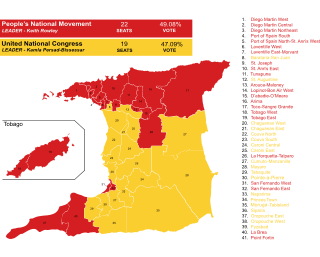
General elections were held in Trinidad and Tobago on Monday, 10 August 2020, to elect 41 members to the 12th Trinidad and Tobago Republican Parliament. It was the 14th election since gaining independence from the United Kingdom in 1962 and the 22nd national election in Trinidad and Tobago ever. Tracy Davidson-Celestine, political leader of the Tobago Council of the People's National Movement (PNM) became the first woman to lead a Tobagonian political party with representation in the House of Representatives. Additionally, two of the three largest parties elected in 2015, the United National Congress (UNC) and the Congress of the People (COP), were led by women.
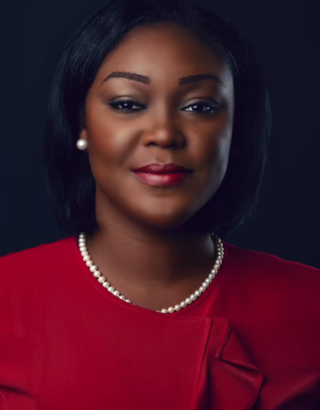
House of Assembly elections were held in Tobago on 25 January 2021 where 12 members were elected in the eleventh election since the Assembly was established in 1980. This election marked the first time in history that both parties elected, the People's National Movement (PNM) and Progressive Democratic Patriots (PDP) won an equal number seats of 6-6, despite the PNM winning the popular vote, resulting in a deadlock and a constitutional crisis with both political parties and Prime Minister Keith Rowley seeking senior counsel advice on the way forward. This election was the first time after 20 years in power that the PNM lost its absolute majority. This election also marked the first time a female political leader was elected to the Assembly and the first time a woman led a major political party or a political party with representation in the Assembly, following the 2020 Tobago Council of the People's National Movement leadership election where Health Secretary, councillor and former Trinidad and Tobago Ambassador to Costa Rica and former Deputy Chief Secretary of Tobago Tracy Davidson-Celestine made history by being elected as the PNM's first female political leader at the regional or national level and one of the first bilingual political leaders in the country's history. If Davidson-Celestine and the PNM were to be elected with a majority to their sixth consecutive term in office, she would have made history, becoming the first female Chief Secretary of Tobago. The election was held alongside local by-elections in Trinidad in which the PNM and UNC retained two districts and the PNM losing one to the UNC.
The 2022 People's National Movement leadership election, the last one for the PNM before the subsequent general election, took place over three days: November 26 and 27 and December 4, 2022. The current party leader and Prime Minister Keith Rowley had indicated he would most likely not seek to lead the party into the next general election. Rowley made these comments in his victory speech on the night of the 2020 Trinidad and Tobago general election, where the PNM secured a second mandate under his leadership but with the slimmest majority for a government in two decades. However, he announced that he would seek another term as the party's leader in October 2022. In the 2020 general election campaign, he indicated that he would have stood down had the PNM lost. The election followed the 2022 Tobago Council of the People's National Movement leadership election. Keith Rowley won re-election by an overwhelming majority with a low voter turnout with 9,111 out of 105,894 eligible party members voting.
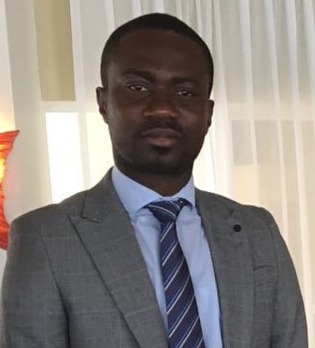
Snap House of Assembly elections were held in Tobago on 6 December 2021 to elect all 15 members of the Tobago House of Assembly (THA). The election was called following a deadlock created by the January 2021 elections which resulted in a tie between the People's National Movement (PNM) and the Progressive Democratic Patriots (PDP), with both parties winning six seats. As a result, the number of seats in the legislature was increased from 12 to 15 to avoid ties.
Esmond Irving Forde is a Trinidad and Tobago politician representing the People's National Movement (PNM). He has served as a Member of Parliament in the House of Representatives for Tunapuna since the 2015 general election. He is the current Deputy Speaker of the House.

The 2023 Trinidadian local elections were held on Monday, August 14, 2023, across all 141 electoral districts in Trinidad's 14 municipal corporation electoral areas. The elections follow a 3-2 ruling on May 18, 2023, from the United Kingdom's Judicial Committee of the Privy Council, the Republic of Trinidad and Tobago's highest court of appeal, which stated that the government's one-year extension of the mandate of councillors and alderman was unlawful. The matter was brought before the Law Lords of the Privy Council by Ravi Balgobin Maharaj, and his legal team led by Anand Ramlogan, SC. The legal action taken by Ravi Balgobin Maharaj was necessary after the PNM government decided to extend the election by one year, which the Privy Council ruled was inconsistent with the rule of Democracy. The judgement handed down to Ravi Balgobin Maharaj by the Law Lords was a landmark ruling in the Commonwealth and marks the first time that a Court upheld the rights of citizens to vote in a Local Government Election.














